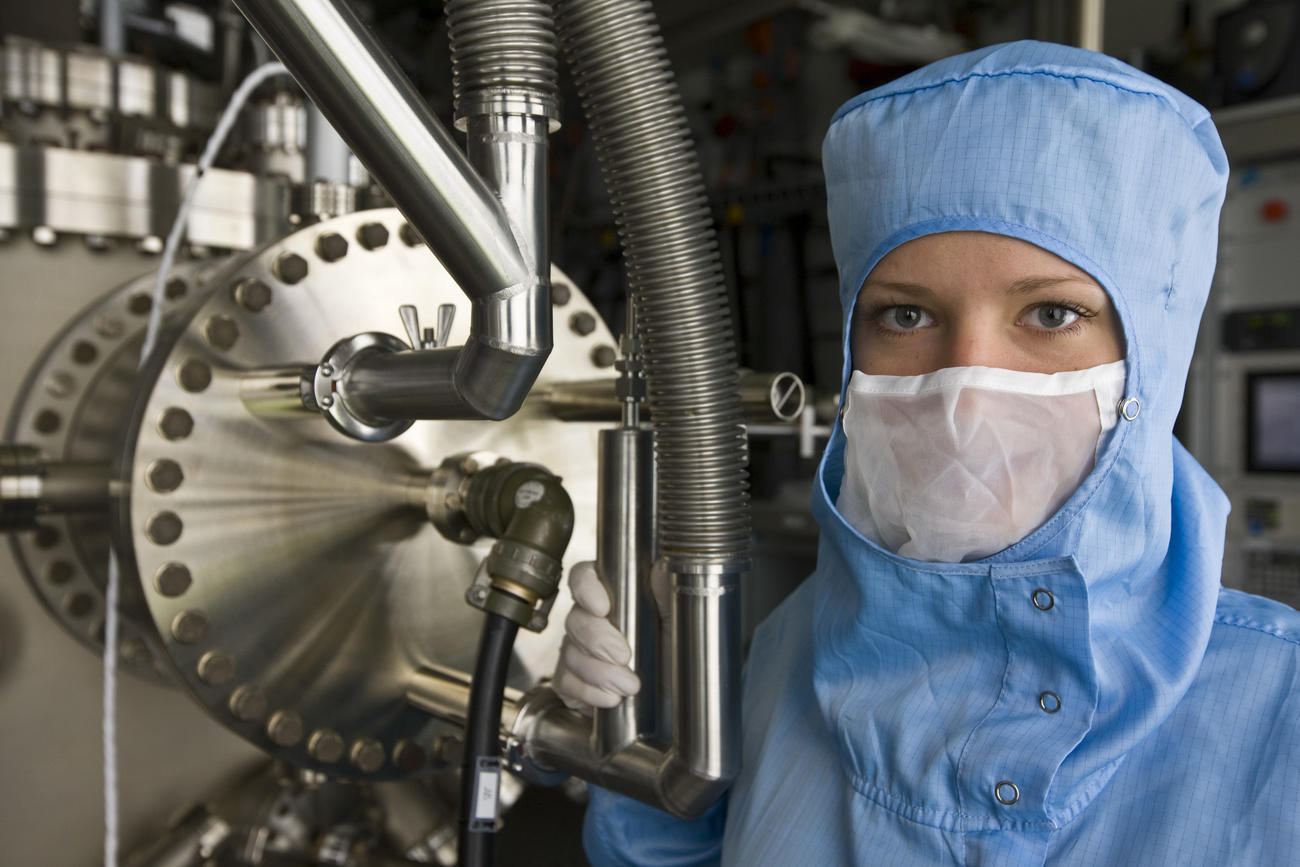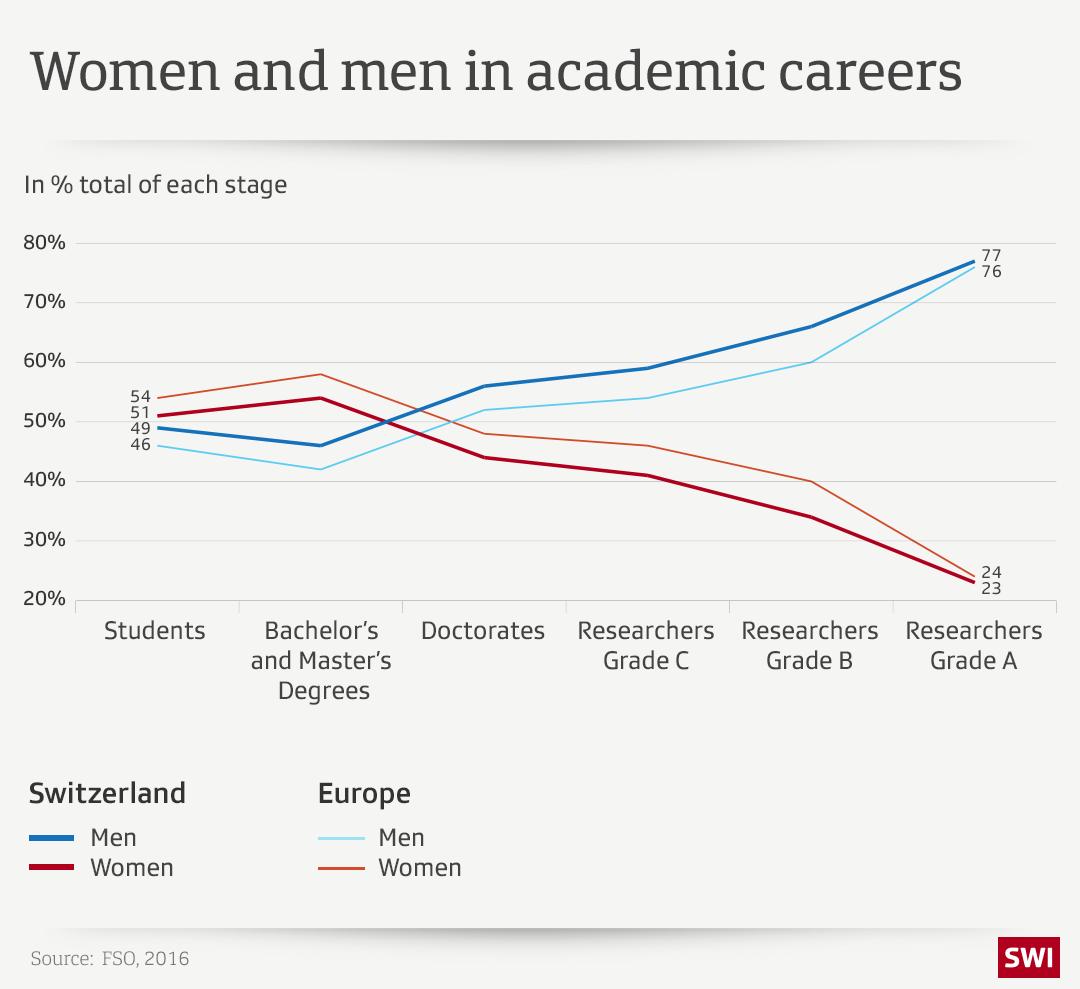
Women still struggle to make inroads into science

The United Nations’ International Day of Women and Girls in Science has been highlighting how hard it is for female academics to forge a successful career – and Switzerland is no exception.
“The world must not be deprived of the potential, the intelligence, or the creativity of the thousands of women who are victims of deep-seated inequality and prejudice… Humanity has everything to gain – and so does science,” said UNESCO’s Director General Audrey AzoulayExternal link on the international day, which was marked on February 11External link.
According to UNESCO, less than 30% of scientists worldwide are women. And they account for less than a third of students taking STEM subjects (science, technology, engineering and mathematics).
And Switzerland?
It’s not any better in Switzerland, as evidenced by the European Commission’s report She Figures 2018External link. Like its neighbours, the higher up the hierarchy you go, the fewer women there are in science.
The latest Women and ScienceExternal link figures from the Swiss Federal Statistical Office (2018) bears this out. Women make up 51% of university students, and account for 54% of degrees at Bachelor’s and Master’s level. But then the pendulum swings back: women make up 44% of doctorates, 41% of mid-ranking academic staff and 23% of top-level posts.
Leaky pipeline
This progressive disappearance of women from science – known as the “leaky pipeline” – seems to be a universal issue and is prevalent in other areas such politics, management and business.
Take this example of the leaky pipeline as highlighted by the French-speaking daily Le TempsExternal link. At the Lausanne University Hospital, women not only account for the majority of medical students, but also of junior doctors (62% in 2017). Then there’s a big drop: women make up 28% of senior physicians and just 12% of chief physicians. In fact, the hospital only appointed its first female department head in 2018.

Changing structures and mentalities
In science, as in other sectors, careers are forged at an early stage and in a highly competitive environment. But many young women drop out and start families, just as their male peers are pressing on with their careers.
In 2014, Susan Gasser, president of the Swiss National Science Foundation’s Gender Equality CommissionExternal link, wroteExternal link: “I believe they do this based on subconscious assumptions or misdirected beliefs, for instance, that having a family and an academic career are mutually exclusive, or even – god forbid – that men are better suited for science than women.”
It’s a deep-seated cliché: a scientist is male. You just have to look at the statistics for the Nobel prizes in chemistry, physics and medicine: less than 5% of the winners in more than a century have been women. And when he is creating a research team, a male professor is more likely to chose male colleagues. Attitudes are changing, but every slowly.
Women only
Help is on hand. The SNSF’s PRIMA grant programmeExternal link (promoting women in academia), was created in 2017 and is aimed at female researchers who show high potential for obtaining a professorship.
PRIMA grants cover the grantee’s salary and project costs for five years, allowing her to conduct an independent research project.
In all, 22 female researchers benefited from the grant in its first year of operation and 19 in the second year, the variety of projects showing that women can excel in all areas of science.

More
Why talented women are disappearing from Swiss universities
Translated from French by Isobel Leybold-Johnson

In compliance with the JTI standards
More: SWI swissinfo.ch certified by the Journalism Trust Initiative






























You can find an overview of ongoing debates with our journalists here . Please join us!
If you want to start a conversation about a topic raised in this article or want to report factual errors, email us at english@swissinfo.ch.